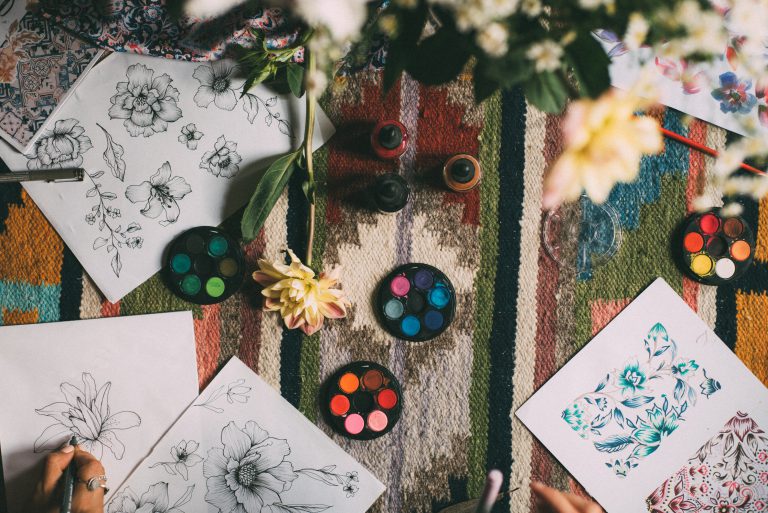It might surprise you to know that I have taught visual art for many years, before I took a deeper dive in to workshop hosting! On many occasions I was asked to create a custom experience or workshop for an event. This naturally lead me to workshop hosting. One of the reasons, that I felt so excited to host workshops was the ability to spend more time working on my own art form. I realized that some of those tips and tricks that i learned over many years of teaching might be helpful to you, when you begin to host your first workshops. I truly feel that these can be applied to any creative workshops- but for the sake of this article- I will focus on craft!

1. Be Prepared
First and foremost, you will want to prepare for your upcoming workshop that you are going to host. This means everything from the content, structure and workshop setting. You will have supply set-ups and demonstration materials. You will need to consider table sizes, which size you need and how many. You might consider the logistics of each setting, are people working in small groups or listening to a panel. You will want to have any hand-outs or visuals ready in advance. Some people may find it helpful to work from a checklist, leading up to the workshop.
2. Beginner Mindset
When thinking about the workshop and program you will provide. You will want to consider what questions your guest might have and what you hope to teach them. One way to do this is to reflect upon what questions you had when you first started practicing your your craft or technique. What did you really want to learn? What were you curious about? What was challenging? Write those things down and make sure to include them.
3. Create Opportunities
I find that my guests like to have opportunities to connect. They enjoy making meaningful connections to the content of the program, yet also they love to connect in person and in virtual workshops. Taking a workshop, where you continue your education is both social and academic. During the instructional portion, I like to impart a decent amount of information and then in the studio time when everyone is working. I provide opportunities for participants to share something about themselves (think: fun facts! or their work to make connections).
To receive your free topic selection tool & learn more about workshop hosting- join our mailing list!
4. Provide Structure
Which brings me to another important aspect of the workshop day, providing structure. I will share with you how I generally structure workshops and events. I recommend starting with an introduction, both to yourself and amongst guests. Then, I continue with an introduction to the process! This usually includes some type of visuals and leads to a demonstration or short lecture (depending on the workshop!) After, the demonstration I open it up to studio time, which is the time dedicated to the process of art making or technique (it could be writing or yoga!- it really just depends on your workshop topic!) So here is how I break things down:
- Introduction
- Demonstration
- Process time
- Lunch or Break
- Studio time
- Reflection or Closing Circle
I also recommend sharing your general outline or itinerary for the day in advance, in an email or at the start of the program so everyone can follow along! Guests like to know what’s going to happen next. I currently offer a course with a strategy session that goes into detail about the workshop format.
I am so passionate about helping other artists and creatives host their own workshops that I have created The Creative Workshop Formula, specifically for creatives who wish to create their own in-person or online workshops and courses. This currently includes a strategy session where we can discuss any obstacles or questions about hosting.
5. Relax & Enjoy!
Last but not least, take a deep breath and relax. You know the subject well and you are prepared for your workshop day. No matter what happens, be sure to relax and enjoy the moment! If there are some small changes or things that come up- take mental notes. Remember, only you know the whole plan and it’s likely that if your guests are learning and you are relaxed, then you will be able to help them more effectively. This is the big day that you have been planning and dreaming of and it’s sure to create lasting memories. If it goes well, you will certainly have more opportunities to share your workshop again and again as you grow.
I truly believe that anything you teach in person can most likely be taught online- and both are good places to develop signature workshops.
